Navigating NYC construction permits is crucial for your business. First, understand the mandatory permit requirements for your project. Next, engage a qualified expediter to help guide you through the process and ensure accurate documentation. Define a clear strategy by setting milestones to manage your progress effectively. Prepare for pre-filing meetings to address any concerns early on. Stay organized and responsive by keeping track of your application's status and maintaining detailed records. Utilize online resources like DOB NOW for efficient permit tracking. Keeping these tips in mind will help streamline the process and lead to a successful construction project.
Understand Permit Requirements
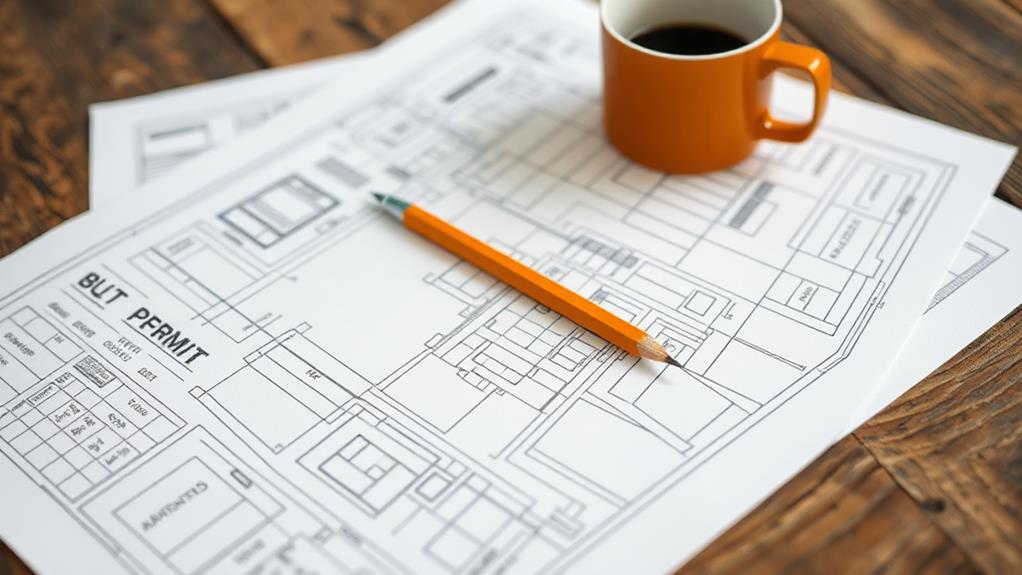
When diving into the world of NYC construction permits, it's essential to grasp the permit requirements that govern your project. Understanding the importance of urban redevelopment efforts is crucial, as building permits are mandatory in New York for new constructions, significant renovations, and demolitions.
These permits ensure your project complies with safety and zoning regulations outlined in the NYC Construction Codes.
When considering your construction projects, you'll need to understand the permit process, which varies based on the type of permit required. For example, you might need a New Building (NB) permit for new structures or an Alteration (Alt) permit for renovations.
There are specific categories, like Alt1 and Alt2, that correspond to the extent of changes you're planning.
Don't forget, minor alterations—like painting—typically don't need a permit, while emergency repairs, such as fixing a gas leak, are also exempt.
The average processing time for a building permit ranges from 1 to 3 months, but expedited options are available for certain applications.
Understanding the applicable laws, requirements, and fees is crucial, as costs can vary widely based on your project's size and complexity.
Always consult licensed professionals to navigate this process effectively.
Engage a Qualified Expediter
Navigating the intricate maze of NYC's construction permit process can be daunting, but engaging a qualified expediter makes it significantly easier.
These experts, such as a New York State Registered Architect (R.A.) or a Professional Engineer (P.E.), are essential for guiding you through the permitting process effectively and ensuring effective project management throughout the project lifecycle.
Here are four key benefits of working with a qualified expediter:
- Early Engagement: Bringing in an expediter early in your construction project streamlines document filing and boosts your chances of timely permit approval.
- Permit Identification: They help you determine the right permit types, like New Building (NB) or Alteration Type 1 (ALT1), based on your specific project requirements.
- Cost and Time Efficiency: A qualified expediter knows the latest regulations, which can minimize amendments to filings, saving you both time and money.
- Smooth Communication: Effective communication with your expediter ensures all necessary documentation is accurately prepared and submitted, making interactions with the Department of Buildings (DOB) much smoother.
Define a Clear Strategy
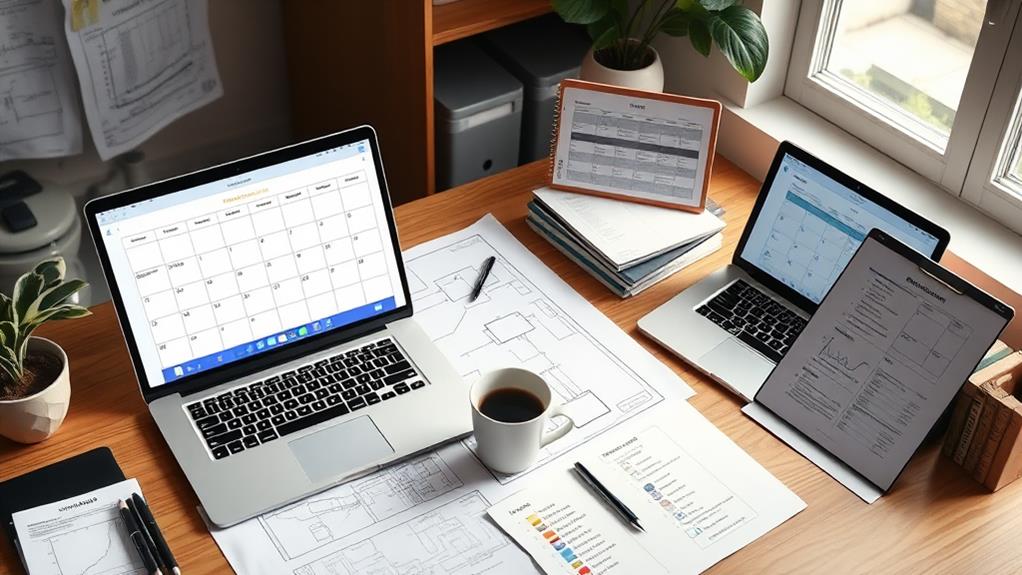
To ensure timely project completion, defining a clear strategy is essential in the NYC construction permit process. A well-structured strategy can significantly streamline your journey through acquiring building permits.
Start by identifying specific milestones in your plan, as this is crucial for managing the unique challenges of NYC construction, such as navigating complex zoning and regulatory environments. Regular assessments against these milestones help keep your project on track and focused.
Engaging a project manager can also make a big difference. This person will drive the team towards meeting established objectives, ensuring all stakeholders are aligned and informed throughout the process.
Make use of the Department of Buildings (DOB) resources, like the Step by Step tool. This tool outlines the necessary permits and licenses you'll need, making it easier to navigate the approval process. For example, you can find commercial construction solutions that help address these challenges more effectively.
Additionally, don't forget to incorporate feedback from previous projects. Learning from past experiences can help refine your strategy, minimizing amendments to DOB filings and enhancing overall efficiency.
Prepare for Pre-filing Meetings
After establishing a solid strategy, the next step involves preparing for pre-filing meetings with the NYC Department of Buildings (DOB).
These meetings are crucial for discussing your project specifics and clarifying requirements before submitting your application and plans. By doing this, you ensure compliance with building codes and regulations.
To make the most of your pre-filing meetings, consider the following:
- Bring Relevant Documents: Gather all project documents, including architectural plans and property information, for a thorough review by DOB staff.
- Discuss the Scope of Work: Be ready to explain your project's scope, timeline, and any special considerations. This helps facilitate a productive dialogue.
- Identify Potential Issues: Discussing your plans early can significantly reduce permit processing time by addressing any potential concerns before formal submission.
- Use the Step by Step Tool: Familiarize yourself with necessary permits and licenses by utilizing the Step by Step tool available on the DOB website.
Stay Organized and Responsive
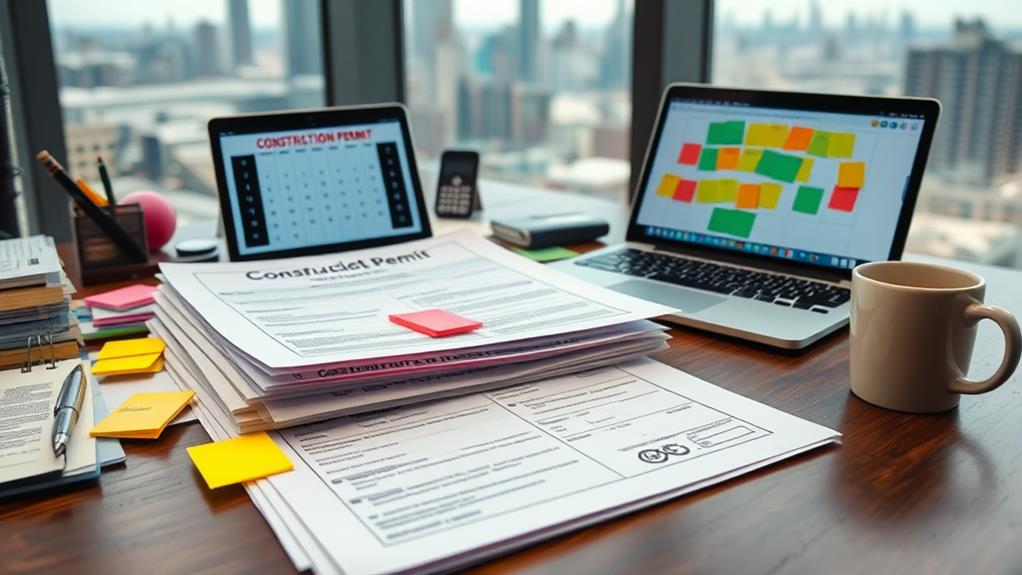
Staying organized and responsive throughout the permit application process greatly increases your chances of success.
First, maintain a detailed project timeline to track critical milestones and deadlines. This ensures you submit all required documents for your NYC construction permit on time.
Regularly check the Buildings Information System (BIS) to monitor the status of your application. If the Department of Buildings (DOB) requests additional information, respond quickly to avoid delays.
Keep all correspondence and documentation organized, including permits, plans, and communications with licensed professionals like architects and expediters. This organization helps streamline responses and makes it easier to find the information you need.
Establish a dedicated point of contact within your team to manage all permit-related communications. This person should ensure that inquiries are answered swiftly and effectively.
Utilize Online Resources
Navigating the NYC construction permit process can feel overwhelming, but utilizing online resources simplifies it significantly. By taking advantage of the tools available, you can streamline your efforts and ensure compliance with NYC regulations.
Here are four essential online resources to consider:
- DOB NOW: This platform allows you to submit applications, track permits, and access inspection schedules, making the permit process more efficient for your construction projects.
- Buildings Information System (BIS): Use BIS to review property history, including permits and violations. This database is essential for understanding the specifics of your project.
- Step by Step Tool: This tool helps you identify necessary permits and licenses based on your project's unique needs, ensuring you meet all requirements.
- Buildings News: Subscribe to stay updated on changes in regulations, inspection timelines, and vital notifications regarding your construction projects.
Keep Track of Timelines
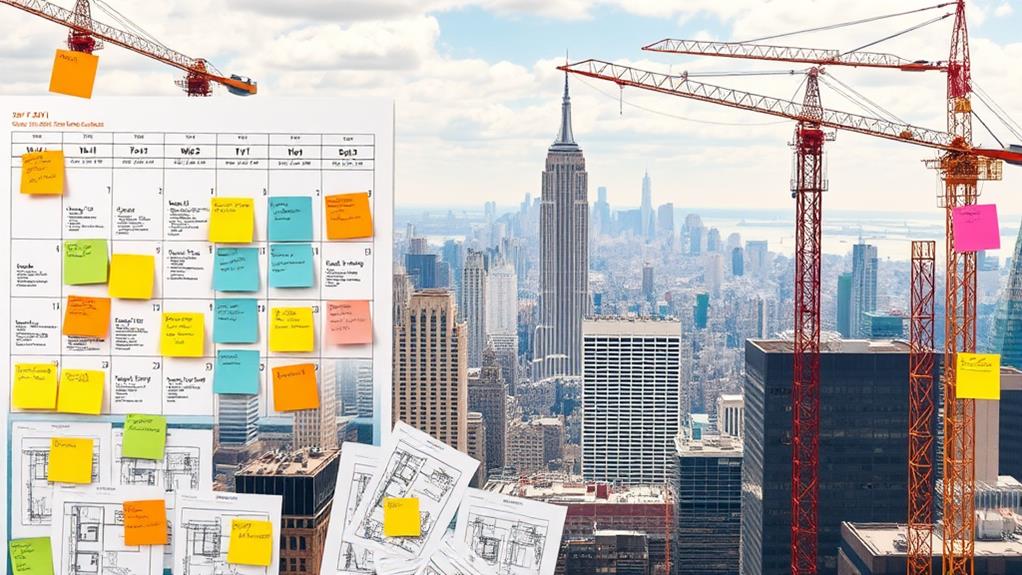
Keeping track of timelines is vital for successful construction projects in NYC. The process for obtaining a NYC building permit can vary significantly, with average processing times ranging from 1 to 3 months. If you opt for self-certification, you might receive approval in just 3 to 4 weeks.
However, if you choose Alt1 standard filing, prepare for a wait of 3 to 4 months. Setting clear project milestones is essential, as it allows you to assess your progress regularly and ensure timely permit acquisition.
Engaging an expediter early in the process can also streamline your timelines. They can help navigate the complex codes and regulations, facilitating quicker approvals. For specific scenarios, landmark approvals can be expedited to just 4 to 7 business days if you have urgent needs.
To stay updated on your application's status, utilize the DOB's online resources, such as the Building Information System (BIS) and DOB NOW. These tools help you track your application and any changes in timelines, ensuring you're always informed as the DOB approves an application or makes adjustments.
Conclusion
Navigating NYC construction permits may seem like a daunting task, but with the right approach, it can be a smooth journey. By understanding the requirements, engaging experts, and staying organized, you can turn potential headaches into manageable steps. Remember, being proactive and responsive will keep your project on track. So, take a deep breath, follow these tips, and you'll be well on your way to making your business dreams a reality in the vibrant city of New York.

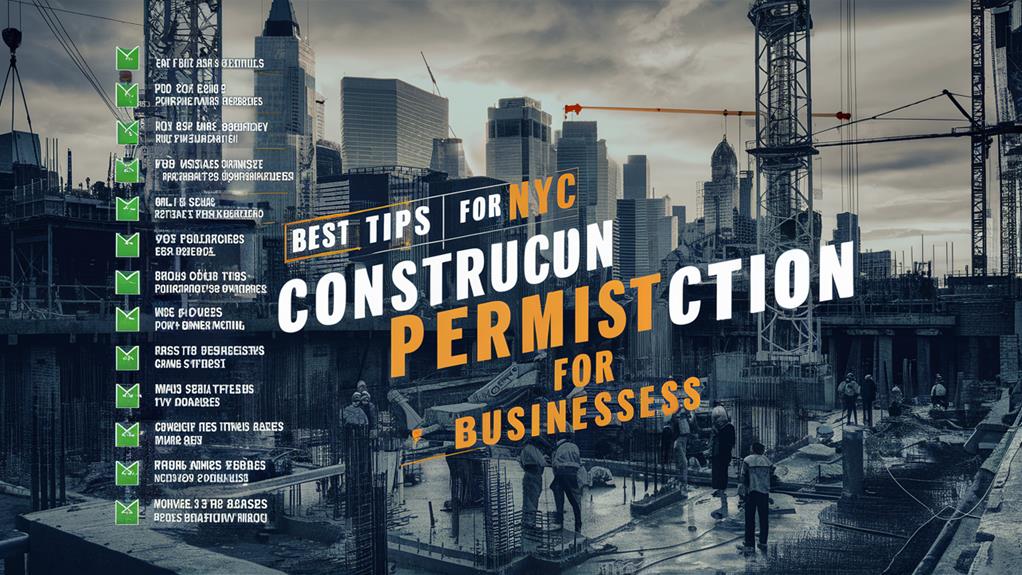
Leave a Reply